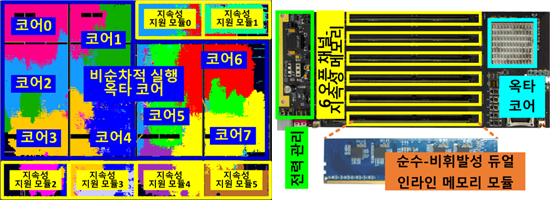
[ Prof. Myounsoo Jung, KAIST Ph.D. Candidates (Miryeong Kwon, Sangwon Lee, and Gyuyoung Park), from left]
Our department’s Professor Myounsoo Jung’s research team has developed the world’s first nonvolatile computer maintaining execution states without power supply when power fails.
The research team has developed the ‘ Lightweight Persistence- Centric system ( LightPC)’, which uses nonvolatile memory as a main memory, that can maintain all execution states regardless of power supply state. LightPC outperforms compared to conventional volatile computing systems by 4.3x while reducing power consumption by 73%, and providing 8 times larger memory capacity.
Nonvolatile memory is a type of computer memory that can retain stored information even after power is removed. It provides larger capacity and consumes lower power compared to DRAM which is volatile memory, but, nonvolatile memory provides lower write performance. Because of this shortcoming, existing nonvolatile memory, such as Intel’s Optane memory, is used with DRAM. However a computer with the existing nonvolatile memory system has a problem that data in DRAM needs to be transferred to nonvolatile memory or SSD in order to retain execution states.
To solve this problem, the research team developed processor and memory controller that raise nonvolatile memory’s performance and also developed OS for maintaining all execution states of the nonvolatile memory based computer. With our proposed techniques even if power is suddenly cut off, LightPC can restore the state before the power loss. The research team implemented the proposed LightPC on their FPGA-based system board prototype and verified the effectiveness of LightPC.
This work is expected to be utilized in a variety of ways, such as data centers and high-performance computing, as it can provide large-capacity memory, high performance, low power and service reliability.
The KAIST Ph.D. Candidates (Miryeong Kwon, Sangwon Lee, and Gyuyoung Park) participate in this research, and the paper (LightPC: Hardware and Software Co-Design for Energy-Efficient Full System Persistence) will be reported in June at ‘International Symposium on Computer Architecture, (ISCA) 2022’.

The research was supported by the MEMRAY, Ministry of Science & ICT (MSIT), National Research Foundation of Korea (NRF), and Institute of Information & Communications Technology Planning & Evaluation (IITP).
More information on this paper can be found at CAMELab website (http://camelab.org) and YouTube (https://youtu.be/mlF7W_RmYRk). This result has been reported by domestic media as follow.
[Link]